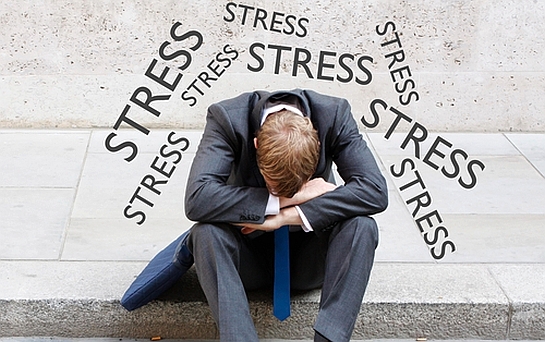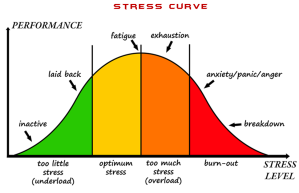
Sunday nights are usually family movie night in my household, and this past weekend we watched Angel in the Home (aka Foster).
The movie was sweet, but also dealt with a fairly dark topic. It’s about a couple who have experienced a tragedy in the past, and they are unable to conceive. They decide to foster a child who is wise beyond his years, and in the process of fitting this child into their lives they realize that their relationship has broken down, and they learn to rebuild the love that has been lost. It had some pretty powerful moments, and I think presented an honest look at the breakdown of love.
Watching the movie tied in to some of the things I’ve been thinking about lately. Namely the idea that stress (either in the form of a single traumatic event or extended periods of stress) will damage and can potentially destroy relationships.
Stress in Relationships
When I was younger I remember hearing about a local family whose child was killed in an accident, and how the tragedy caused the couple to split apart. I didn’t understand it at the time. There were other children in the family, and in my mind the other children would need their parents even more after the loss. I also thought that as a couple, one of the biggest roles we play is to be there for each other. Couples are supposed to be safe havens for each other, where no matter what the world throws at them, they will always be there for each other.
Naively I thought that a tragedy like that would be a time that the couple would depend upon each other even more, and that somehow it would bring a couple closer together. But all the evidence shows that is not the case.
It doesn’t even have to be a specific tragedy. Even without a specific trigger, extended periods of stress commonly cause relationships to break down. An article on stress in relationships describes this as follows:
When you are stressed you can become less-than-careful with the person you love. You concentrate on your own situation and forget how it affects your partner. Soon you have a vast gulf in understanding, and ultimately this could lead to the breakdown of the relationship.
The Stress Management Society’s relationship experts have seen stress cause divorce. Their advice is to make your relationship a priority.
Only The Strong Survive?
What does it mean when stress causes a relationship to break down? Is that perhaps a reflection on the relationship itself? Maybe it just means the couple wasn’t “meant to be”, or their love wasn’t strong enough to survive.
Any longtime readers know that I don’t believe in “meant to be”. I think life gives us opportunities for things, and it’s up to us to determine what we want to do with those opportunities. We can make the most of them, or we can squander them.
But even for couples with strong “couples skills” that are doing their best at focusing on the relationship, extreme stress can be a killer:
It would nice to think that the stronger the relationship is, the more likely it will survive if one of both partners is suffering from the effects of severe stress, but sadly the reality is very different. A study carried out by Neff, L.A. and Karney in 2009 and published in the Journal of Personality and Social Psychology found that relationships exposed to high levels of stress over a long period of time faltered, irrespective of how good they were.
Even when each person had good relationship skills, exposure to stress changed their perception of the relationship. Ultimately, this led to a breakdown in communication, anxiety, arguments, and all kinds of other relationship problems.
One important thing to note is that it doesn’t matter what the actual source of the stress is. The stress may be completely external to the relationship, and it is still liable to spill over into the relationship.
In discussing the same 2009 study, Dr. John Grohol states that in times of stress:
In times of stress we are more likely to see the relationship as being negative, not realizing the impact the stress is having in the validity of our evaluation — it colors our perception of the relationship itself. Remove the stress, and people’s positive relationship skills can once again — and usually do — take over.
The take-away for couples is simple — each individual needs to learn to deal with stress in positive ways outside of the relationship (through activities to minimize the buildup of stress in the first place, regular exercise, and other stress-relief activities). No matter how well you function in everyday life, all the skills in the world may go to hell in a hand-basket when stressed out.
The Stress Curve
We all manage stress differently. Some people have a higher tolerance level for stress than others, but no matter where your tolerance level lies we all have a point that it starts to take a toll.
Look at the following “stress chart”:

We may have different thresholds, but no matter where your threshold is there are physiological affects once you have hit it. Exhaustion, irritability, anger, and eventually breakdown.
I’m sure we’ve all experienced this on some scale. Maybe it’s a hard day at work, a struggle with the kids, or even a bad experience while driving. Whatever it is, the stress of the situation has put us near or past our threshold line, and as a result we are irritable.
Who do we take it out on? Interestingly, we can usually “keep it together” when we need to such as at work or in a public setting. Instead it’s at home that our frustrations come out, so the person on the receiving end is often our partner or our children. Maybe they do something to set us off and our response is out of proportion with what they have done. Maybe they don’t even do anything.
Psychologists say we do this at home because it is there that we can let our defenses down. It is our place of safety. But as a result, we are taking out our frustrations on the people we are supposed to love the most.
Stress and Intimacy
One of the side effects of stress is that it breaks down intimacy. It’s important to understand this link, because often a breakdown of intimacy is seen as a sign of issues in the relationship. From the article above:
When life gets tough, stress can cause communication to break down and intimacy levels to suffer. Stress can also affect our libido and, unfortunately, stress and sex drive issues may eventually cause a relationship meltdown, particularly if neither partner is willing to address the issue. So before your relationship hits the buffers due to chronic stress, it is essential that you understand the link between stress and relationship problems.
When one partner is suffering from the effects of extreme stress, a diminished sex drive can be the end result. No two people are the same, but men and women often react differently to stress. Women are more likely to lose their desire to have sex when stressed, but chronic stress is just as likely to affect the male libido, too. And when one partner is continually being given the cold shoulder in bed, it will not be long before the relationship begins to suffer.
Dealing with Stress
Due to the effects of stress on relationship, it seems obvious that in order to preserve the health of a relationship a couple has to pay attention to their levels of stress.
At their core relationships are based on empathy, and stress breaks that down. So when experiencing stress it’s very important not to lose sight of the relationship. It’s very easy to get caught up in how the stress affects you and makes you feel, and lose sight of your partner – their needs and how the stress is affecting them.
Highly stressful situations should be avoided where possible. However it’s not always possible to change stress levels, so it’s also important for a couple to try and develop mechanisms for dealing with stress (both individually and as a couple).
No matter what is happening, it’s important that communication remains part of the relationship. Stressful times and situations often can’t be avoided, so keeping communication strong is the key to surviving difficult times.
Once communication breaks down, the relationship often follows.
Way to hit the nail on the head! I really hope those who need to (and would “get” it) read this. Thanks!
LikeLiked by 1 person
I think it’s important for everyone to understand the impact stress has on relationships. When people are stressed, and at or near their threshold, the unfortunate effect is the tendency to take those stresses out on the very people who we would profess to care about the most.
It’s important to try to keep stress levels down while learning to develop healthy coping mechanisms for dealing with stress.
That’s probably one of the best things your can do for both your own well being and the health of your relationships.
LikeLike
A while back I saw this article and thought that it’s relevant to your post:
http://www.bbc.com/news/health-30831145
It’s an article that shows when mice are under stress, they have less empathy towards other mice that are in pain.
From personal experience, I know that when I’m stressed, all I think about is myself. It makes sense as the stress response is supposed to insure your survival, so thinking of only yourself is fine when a bear is chasing you, but not good when you’re with friends and family.
The point is that most people don’t realize that they’re stressed and that this stress is causing them to “shut out” their loved ones and only focus on themselves. It’s a self defeating behaviour that can be rectified, if a person wants to.
LikeLike
Thanks for the link. In many ways the point of the post was to highlight that when we are under stress we retreat into “me” mode, and we often end up transferring our frustrations and potentially aggression onto the people who love us – even when they haven’t necessarily done anything to warrant it.
Stress does a lot of damage to both individuals and relationships. If we understand this, I think we are in a better position to guard ourselves from doing this (or at least recognize it when it’s happening).
LikeLike
Pingback: When Hope Fails | thezombieshuffle
Pingback: Coping With Life | thezombieshuffle
Pingback: Living with Anxiety Part 2 – Doubting Love | thezombieshuffle
Pingback: How Does Parenting Affect Your Relationship? | thezombieshuffle
Pingback: What do you bring IN to your Relationship? | thezombieshuffle